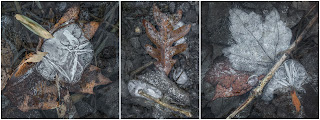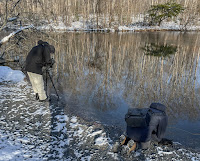Ernst Cassirer (1874 - 1945)
An Essay on Man
Monday, January 10, 2022
Different Schemes and Patterns
Sunday, January 09, 2022
Ceaselessly Creative
the most complex system
we know of in the universe,
breaks no law of physics,
yet is partially lawless,
ceaselessly creative."
- Stuart Kauffman (1939 - )
Saturday, January 08, 2022
Nonlinear, Experiential, and Receptive
"The creative process,
like a spiritual journey,
is intuitive, non-linear,
and experiential.
It points us toward
our essential nature,
which is a reflection of
the boundless creativity
of the universe.
...
To be still means to
empty yourself from the
incessant flow of thoughts
and create a state of
consciousness that is
open and receptive."
- John Daido Loori (1931 - 2009)
Tuesday, January 04, 2022
Embodied Network
- David George Haskell (1969 - )
The Songs of Trees
Sunday, December 19, 2021
Pure Experience
- D.T. Suzuki (1870 - 1966)
An Introduction to Zen Buddhism
Tuesday, December 14, 2021
Forget About Words
once you've caught the fish,
you can forget about the trap.
A rabbit-snare is for catching rabbits;
once you've caught the rabbit,
you can forget about the snare.
Words are for catching ideas;
once you've caught the idea,
you can forget about the words.
Where can I find a person who
knows how to forget about words
so that I can have a few
words with them?"
- Chuang Tzu (c.369 B.C. - c.286 B.C.)
The Essential Writings
Monday, November 29, 2021
Patterns
but patterns that perpetuate themselves."
- Norbert Wiener (1894 - 1964)
The Human Use of Human Beings: Cybernetics and Society
Saturday, November 27, 2021
Constructions in Space
- Bernhard Riemann (1826 - 1866)
Tuesday, November 23, 2021
An Illusion, a Phantom, or a Dream
“So I say to you –
This is how to contemplate our
conditioned existence in this fleeting world:
'Like a tiny drop of dew,
or a bubble floating in a stream;
Like a flash of lightning
in a summer cloud,
Or a flickering lamp, an illusion,
a phantom, or a dream.'
'So is all conditioned
existence to be seen.'
Thus spoke Buddha."
Monday, November 22, 2021
Macro and the Micro
- Ansel Adams (1902 - 1984)
Letter to Alfred Stieglitz
Postscript. The purest simplest joy of life is life itself: living, being, breathing, seeing, feeling, sharing, ... But there are preternaturally precious moments when the experience is so all-consuming and so far transcends what words alone are incapable of revealing (though the wisest among us are sometimes able, in Zen-like fashion, to capture glimpses of the deepest truths), that one is simply lost in the Einsteinian awe of it all ("I have nothing but awe when I observe the laws of nature," as quoted in Einstein and the Poet). For me, this happens (alas, far less frequently than I wish) when I become "lost" amidst the "macro and the micro"; when otherwise arbitrary language-driven distinctions among trees and forest and leaves and space and time ... all dissolve and become one and inseparable. A feeling that seems to be also shared by my eldest son, Noah, who is seen here contemplating his own universe of mysteries by the side of a small footpath he and I took this weekend in a local park:
Wednesday, November 17, 2021
Unheard Music
- Paul Bowles (1910 - 1999)
The Spider's House
Monday, November 15, 2021
The Brown Autumn Came
- Henry Wadsworth Longfellow (1807 - 1882)
Kavanagh
Wednesday, November 03, 2021
Optimal Experience
- Mihaly Csikszentmihalyi (1934 - 2021)
Flow: The Psychology of Optimal Experience
Postscript. Sadly, the deeply inspirational Mihaly Csikszentmihalyi passed away on Oct 20, 2021. He joins an (equally sadly) growing number of spiritual/aesthetic mentors of mine that I have never had the pleasure of meeting in person (the last such being John Daido Loori, who passed away in 2009). I have written of applying Csikszentmihalyi's "flow" to photography a number of years ago on this blog (almost exactly 13 years ago, to be precise), but the wisdom and insights he leaves behind are of course timeless. Here is a link to a great TED talk that Csikszentmihalyi gave in 2004. May your soul forever revel in eternal flow, Mihaly!
Tuesday, November 02, 2021
Wu Wei
- Benjamin Hoff (1946 - )
The Tao of Pooh
Saturday, October 16, 2021
Intemporal Surreality
- G.W. Leibniz (1646 - 1716)
Monadology
Postscript. Or, to paraphrase a well-known aphorism by physicist Werner Heisenberg (and italicizing my photo-centric alteration), "...what we observe and communicate is not nature in itself, but nature exposed to, and transformed by, our method of capturing it with our camera." Keeping with the same themes and questions that underlie my last two posts (i.e., how to best "capture" New Hampshire's gorgeous autumnal colors during a recent "long weekend" trip), one can start off by saying - tautologically - that any image I chose to capture must, by fiat, represent a particular slice of nature that I saw (through my lens). But how much of my experience of the totality of a given scene (the ambient conditions, light, sound, my state of mind, etc.) remains attached to whatever image(s) I chose to use to represent it? How much (or how little) of any of this is communicated and interpreted as such by the viewer? And, what can I do to instantiate and intensify this experience (for the viewer)? Of course, these kinds of questions have been asked since the dawn of photography, with no easy answers; from Alfred Stieglitz's equivalents to Minor White's admonition to take pictures of "what else" things are. The triptych communicates my early-afternoon experience at a quiet little roadside pond (that, objectively speaking, hardly even merits a "label" on a map; it is "just" a spot on the road from point A to point B on a nondescript stretch of a local highway) far better than any single image does. It does so in two ways: first, because it displays not one but several simultaneous and distinct but related views of the same scene, it gently insists that the viewer "fill in the gaps" in her own mind; which cannot be done except by imaging what it must of have been like to stand there taking these pictures (not to duplicate my experience, but to imagine what it was like, transformed by the viewer's own predilections); and second, because none of the individual images show off the colorful trees directly, but via reflection only (and using a slightly longer-than-normal time exposure, as well), there is an implied intemporal surreality (at least I hope that that is the impression it conveys), which is close to what I was "really feeling" when I took these shots. In the end, and as presaged by Leibniz wise words, it all boils down to the primacy and ineffability of perception. And to the even deeper question of who's "doing" the perceiving?
Friday, October 15, 2021
The Intelligible Triad
- Helena Petrovna Blavatsky (1831 - 1891)
Isis Unveiled
Postscript. While still on the subject of yesterday's post (i.e., my family's "long weekend" trip to New Hampshire to experience its gorgeous fall colors), but on a decidedly less mystical level than Blavatsky's elegant passage describes, my problem as a photographer was to find a way to capture the "magic" of experiencing autumnal color. Of course, there are myriad ways of doing so, starting with the obvious: just take pictures of the gorgeous color! However, in practice (as with most artful things that matter), the devil is in the details, and "taking pictures of the gorgeous color" is far from trivial. The core difficulty, as all photographers know, is that a beautiful landscape seldom makes for a beautiful photograph. To be sure, I was surrounded - overwhelmed even - by the sublime beauty of endless assortments of multispectral colored ferns and bushes and trees and leaves ... and all of it is beautiful; but why this fern, or that clump of trees? In a nutshell, this is the core joy and frustration of photography, as a whole; a microcosm of an endless aesthetic struggle, one might say. Even though I captured a fair share of the obligatory "wide vistas" (I may share a picture or two in forthcoming posts), this trip turned out to be mostly about discovering smaller, quieter worlds within ostensibly grander "larger than life" explosions of autumnal color: a ragged leaf on an even raggedier lawn chair; a withered overturned leaf bathing in the cold waters of a small pond; and a newly fallen leaf gently resting on a moss-strewn rock (along the trail that led to the waterfall that appears in yesterday's post). None are Ansel Adams-ish "Wagnerian" landscapes, but the triptych, as a whole, nicely conveys a bit of what I felt as I was gazing at New Hampshire's Ansel Adams-ish "Wagnerian" landscapes of magnificent color - a microcosm inside the great universe!
Friday, September 17, 2021
Wholeness
- Johann Wolfgang von Goethe (1749 - 1842)
Wednesday, September 15, 2021
Evanescent Beauty
has its own beauty,
and in the same field,
it beholds, every hour,
a picture which was
never seen before, and
which shall never
be seen again."
Sunday, August 22, 2021
Forms and Shapes
changed a great deal relative to the ancient one,
the two have had one key feature in common:
i.e. they are both generally ‘blinkered’ by
the notion that theories give true knowledge
about ‘reality as it is’. Thus, both are led to
confuse the forms and shapes induced in
our perceptions by theoretical insight with
a reality independent of our thought
and our way of looking."
- David Bohm (1917 - 1992)
Wholeness and the Implicate Order
Monday, January 25, 2021
Life & Entropy
that's the end result of entropy,
the heat-death of the universe.
The more things go on moving,
interrelating, conflicting, changing,
the less balance there is -
and the more life."






















